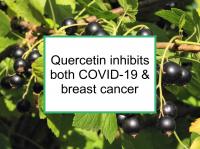Quercetin is a phytoestrogen flavonol found in a variety of fruits and vegetables. Quercetin has been shown to induce the death of hormone receptor positive (ER+/PR+), HER2 overexpressing (HER2+) and triple negative (ER-/PR-/HER2-) breast cancer cells in the laboratory while not harming normal breast cells.
Quercetin has also been found to inhibit angiogenesis (the growth of new blood vessels) of mammary tumors in a mouse model of breast cancer. In addition, quercetin has been reported to enhance the treatment effects of radiotherapy and chemotherapy. Quercetin also appears to protect heart cells from the toxic effects of Adriamycin (doxorubicin) chemotherapy. Now a new study has reported that that quercetin and vitamin D both can inhibit the ability of the COVID-19 virus to enter human cells.
Food sources of quercetin
Quercetin is significantly available in the following foods:
Quercetin supplements are not recommended
Use of quercetin supplements will not necessarily protect against breast cancer and might promote it. When flavonoids such as quercetin are consumed as part of food, they are combined with other micronutrients that have been shown to act synergistically against breast cancer. Consuming quercetin-rich foods is safe. On the other hand, safe and effective dosages of quercetin supplements have not been established.
Quercetin has been shown to interfere with several cytochrome P450 (CYP) enzymes and drug transporters, which suggests that it may alter the response to many drugs, including anticancer drugs. For example, it can inhibit CYP2D6, a crucial enzyme in the metabolism of tamoxifen, which is responsible for the generation of endoxifen, which in turn is thought to account for tamoxifen's beneficial activities in breast cancer patients.
One animal study reported that quercetin supplementation worsened breast carcinogenesis. Another study found that supplemental quercetin promoted tumor growth in animal model of brain cancer. Still another study reported that supplemental quercetin had the potential to interfere with the effectiveness of Adriamycin chemotherapy under some circumstances. Please see the quercetin tag for more information.
COVID-19 study focused on genes that virus uses to enter cells
The study referenced above was designed to identify COVID-19 mitigation agents, i.e., compounds that could reduce the infectiousness of symptomatic patients and the susceptibility of uninfected individuals to SARS-CoV-2, the COVID-19 virus. The researchers focused on two genes (ACE2 and FURIN) which are required for viral entry into cells. Since ACE2 and FURIN are expressed in many types of human cells, including immune cells, SARS-CoV-2 has the potential to infect a variety of cells, tissues and organs in the human body. It is suspected that infection of immune cells could cause immunosuppression, long-term persistence of the virus, and spread of the virus to secondary targets, according to the study author.
Study design
To conduct the study, repressors and activators of ACE2 and FURIN were isolated based on gene silencing and gene overexpression experiments. Identified repressors (VDR; GATA5; SFTPC; HIF1a) and activators (HMGA2; INSIG1) of the genes were then used to find existing compounds with gene expression signatures suggesting they could act as infection mitigation agents.
Study results
Quercetin and vitamin D both were identified as potential COVID-19 mitigation agents as a result of this process. Quercetin was found to alter expression of 98 of 332 of human genes encoding protein targets of SARS-CoV-2, thereby potentially interfering with functions of 23 of 27 (85%) of the SARS-CoV-2 viral proteins in human cells. Similarly, vitamin D altered expression of 84 of 332 (25%) of human genes encoding protein targets of SARS-CoV-2. In fact, the gene expression profiles of quercetin and vitamin D, along with their established safety records, suggest that they might represent viable candidates for further consideration as COVID-19 pandemic mitigation agents, according to the author.
Additional author comments
The author comments that differences in the impact of testosterone compared to estrogen on SARS-CoV-2 targets suggest a possible explanation for the higher male mortality observed during the pandemic. Likewise, age-associated Vitamin D deficiency may contribute to the high mortality of older adults.
The current research is intended to facilitate follow-up experimental studies and, if warranted, relevant randomized clinical trials. In fact, one Granada-based study, Vitamin D on Prevention and Treatment of COVID-19 (COVITD-19), recently was registered in ClinicalTrials.gov.
